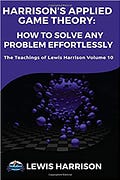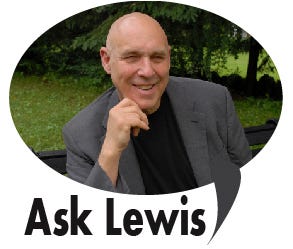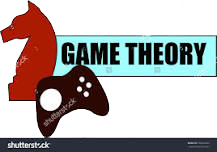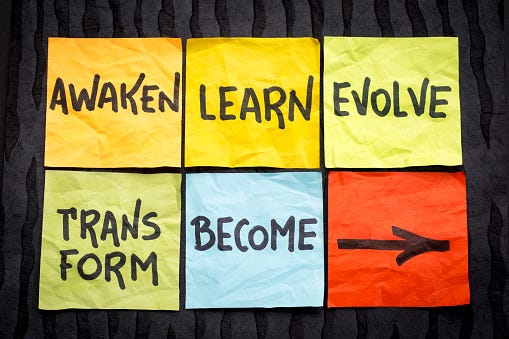The Best Introduction to Game Theory and Critical Thinking
Reducing Cognitive Biases, Logical Fallacies, and Facts that aren't really facts from decision-making
“This newsletter serves a demographic of highly intelligent readers, and deep thinkers with a passion for ideas, critical thinking, strategic game theory, and a desire to understand the world around them. Readers of my posts are usually tired of being patronized elsewhere by fact-less, opinionated know-nothings, misinformation, conspiracy theories, and fake news.
“Knowledge is power, wisdom brings meaning, contentment, and happiness!”
———————————————————
———————————————————
On a personal note: Please excuse grammatical errors, typos, repetition, and any general nonsense, and such in this post. I am getting a bit older now, and I have about 20,000 pages of information that must get published before I leave the mortal coil. I simply write and publish more than my humble editors are able to correct. If you find enough errors you are welcome to contact me about being an editor of my work.
Thanks for sharing this newsletter with your friends and associates - Join us for daily tips on personal development at our free Self-Improvement for Beginners Group and Forum
Click Below or cut and paste the URL to Join
https://www.facebook.com/groups/455029215769173
———————————————————
Game theory is a form of fact-based systems thinking concerned with the analysis of strategies for dealing with competitive situations where the outcome of a participant's choice or action depends critically on their awareness of facts concerning the actions of other participants.
Amazingly, few people ever understand the Importance of facts in strategizing and in making wise strategic decisions.
I’m a bit of an anomaly. Many game theorists are slaves to rationality. The problem is that most humans are emotional and non-rational when making decisions. I was a shaman’s apprentice for over two decades, and I have a Taoist-Zen perspective on many things. Still, with some esoteric influences upon how I think I still have a deep respect and interest in critical thinking.
Critical thinking is the analysis of evidence-based facts in order to form a fairly accurate judgment. The subject is complex, and several different definitions exist, which generally include the rational, skeptical, unbiased, analysis, or evaluation of factual evidence. Critical thinking is self-directed, self-disciplined, monitored, and self-corrective thinking. It presupposes assent to rigorous standards of excellence and mindful command of their use. It entails effective communication and problem-solving abilities as well as a commitment to overcome native egocentrism and sociocentrism.
When you combine critical thinking with game theory, you have a potent formula for making the best choices while also outwitting your adversaries in a win-lose (zero-sum) game.
When you add the ability to read non-verbal cues and to isolate emotional and irrational patterns when analyzing the strategies of others, you have a more expansive approach we call HAGT (Harrison’sApplied Game Theory).
Being that I get so much joy out of the exploration of critical thinking (and its limitations), I believe you will be amused by a somewhat unconventional hobby that I have taken up, and greatly enjoy.
Many of my acquaintances find it a bit strange that I spend so much of my time reading about, studying, and applying game theory strategies and gamer psychology.
My response to their perspective is simple. Game theory and HAGT have made me more EEPPASA (effective, efficient, precise, productive, accurate, and self-aware).
It really is that simple. People talk about the 4-Day work week. Game theory has helped me create a 1-Day work week.
The Study of Game Theory Has Given Me a New Hobby…Talking on the Phone with Conspiracy Theorists and Irrational thinkers who believe they are rational.
I love doing this, and I’m a good listener. Chemtrails, anti-vaxxers, Covid deniers, flat earthers, moon landing deniers, deep state, Qanon, white supremacy, misguided ideas about race, gender, BLM, CRT, sexual orientation, the Swamp in Washington, etc! I listen to all of them.
Keep in mind that uncritical thinking leads people to poor decision-making.
I want to learn to be a better listener and a more tolerant, critical thinker. I also want to serve them if they are open to seeing the possibility that they are way off track when it comes to rational thinking.
Any person who has respect for evidence-based facts, deductive reasoning, inductive reasoning, Bayes theorem of Conditional Probability, and how cognitive biases, and logical fallacies lead to circular reasoning, needs to be charitable enough to engage and listen to polite, communicative conspiracy theorists.
In my life, I am a committed game theorist. To strategize effectively in life one needs to see the importance of facts, rational thinking, and common sense. Most conspiracy theorists will lack two of the three. I say two of the three because if they lacked all three they probably would not and could not survive. In the jungle, they would be eaten by lions.
Contrariwise, if it was so, it might be; and if it were so, it would be; but as it isn’t, it ain’t. That’s logic.
Lewis Carroll
There are a number of subjects of exploration, that I propose to people who want to learn how to apply game theory as a practical tool for winning the game of life.
These subjects include…
Magnification - What may be true at one level may not be true at another. Example. does 2 plus 2 always equal 4?
Cognitive biases: A systematic pattern where individuals create their own "subjective reality" from their perception of available information. An individual's construction of reality, not the objective input, may dictate their behavior in the world, which may lead them to make irrational decisions that appear rational to them.
Logical fallacies: The use of invalid or otherwise faulty reasoning, or "wrong moves", in the construction of an argument, which may appear stronger than it really is if the person “spreading” the fallacy, is articulate, convincing, and skilled at hiding the fallacy in such a way that others can spot the fallacy.
Low-hanging facts (fruit) - Using easy-to-access, weak, unverifiable, and often inaccurate data points to attempt to easily solve problems in a particular situation, or support some pre-conceived solution. Low-hanging facts are clichés often uttered in business settings and are widely used and occasionally abused. Tasks described as "low-hanging facts or fruit" are inconsequential and generally useless for solving real game theory challenges.
Causation and correlation: Correlation means that there is a relationship between two things, but does not always mean that one causes the other. Causation means that A causes B to occur.
For example, concerning Causation and correlation. Correlation means there is some relationship or pattern between the values of two variables, even if it is a minimal relationship or pattern. … Causation means that one event causes another event to occur.
An example of correlation would be a person who is whistling a tune for no apparent reason, who then turns on the radio and hears that song playing on the radio immediately.
Causation would be a person having too much to drink, falling down, and getting a concussion.
When I speak with conspiracy theorists or uncritical thinkers they generally lack an understanding of some of the distinctions mentioned above (even if their conclusion happens to be correct (e.g. the Covid pandemic was connected to a rise in oil and gas prices in 2022),
Ultimately correlation and causation are subjects that many bright and educated know nothing about because they have never been trained to notice the difference between the two.
If you tell them about this distinction, they would often insist you are “using semantics to play mind games just to deny…(Fill in your favorite conspiracy here…”
I have a friend who thinks all this game theory strategy stuff is a waste of time. He says,
“It’s all too much intellect and not enough love and spirituality.”
I’ll let him believe what he wishes.
In Zen, there is an old saying that…
“It is essential to do what needs to be done. The most meaningful life is the one where you actually contemplate on what actually needs to be done and then doing it!”
Some irrational thinkers have emotional issues that cannot be easily transcended. These folks just need to be right about everything, all of the time. There is likely nothing you can present, no matter how much sense it makes, that will change this person’s way of thinking.
But, there are some folks, who really want to learn. The challenge for them has always been that no one ever took the time to present and guide them with a road map for game theory, gamer psychology, and EEPPASA (effective, efficient, precise, productive, accurate, and self-aware) thinking.
When my game theorist peers hear that I seek out people with what I believe to be misguided ideas these peers often respond, “I don’t have the mental or emotional band-with to deal with these people and their stupid ideas”.
This is my response to my game theorist friends.
"In life, we all need to do what gives us pleasure, and which gives our life meaning. I love teaching people and sharing ideas with them. It’s how I connect to humanity. Some people like to teach children, train dogs, and give transformational speeches. I love to give certain types of people a chance to be heard, and a chance to learn things that can help them make wiser choices. Idea’s that if heard, understood, and applied might make their lives better and improve the lives of those they interact with. Do I succeed most of the time? No! Yet listening to these conspiracy theorists can be a type of meditation. No, much of what they believe does not make sense and even borders on the absurd.
When we understand that outside circumstances do not take place in a vacuum; that they are a step in a long chain of unseen causes and effects, then our entire perspective on life will change. By seeing where we fit in the world and teaching others where they fit in the big picture, we can come to know where our freedom lies.
Game theory, and strategically thinking using the principles of gamer psychology and HAGT has enabled me to become more conscious when I make choices. In this state, I am less inclined to make poor decisions, or have a need to complain about anything.
I created Lewis Harrison’s Applied Game Theory Community and Group on Facebook to help others to ponder the choices they have made in life, and how have these choices brought them to where they are? If you are not a member yet please join us by clicking below…
“Game theory is about exploring of freedom of choices and the equilibrium which comes from understanding the consequences of freedom.
― Vineet Raj Kapoor
The Takeaway
A mind defined by a clarity of thought will create a life free of struggle, suffering, and complaints. Of course, to get anything done in life, you will need to make some basic predictions. Game theory helps us them without attachment or expectation concerning the results. In such a situation, understanding the Butterfly Effect, Black Swans, the Theory of Constraints, Prisoner’s Dilemma, Diner’s Dilemma, and Nash Equilibrium will help you to solve problems by effectively understanding the patterns that form cause-and-effect reactions.
—
About The Author: Lewis Harrison is a best-selling author who uses predictive analytics and applied game theory to isolate cost-effective solutions to all levels of business and social problems. His website is AskLewis.com. Learn more about his courses on game theory and his mentoring programs. He can be reached by email at LewisCoaches@gmail.com. I will respond within 24-hours.








